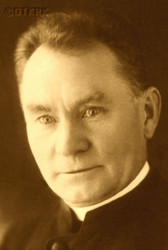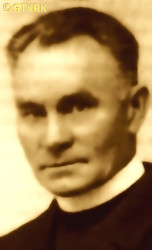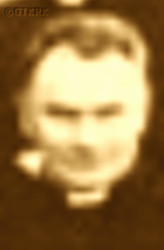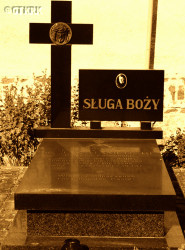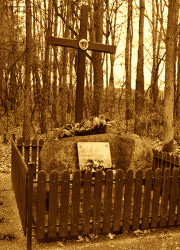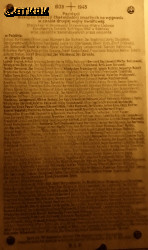Roman Catholic
St Sigismund parish
05-507 Słomczyn
85 Wiślana Str.
Konstancin deanery
Warsaw archdiocese, Poland
full list:
displayClick to display full list

searchClick to search full list by categories
wyświetlKliknij by wyświetlić pełną listę po polsku

szukajKliknij by przeszukać listę wg kategorii po polsku

Martyrology of the clergy — Poland
XX century (1914 – 1989)
personal data
religious status
Servant of God
surname
HAMERSKI
forename(s)
John Joseph (pl. Jan Józef)
function
diocesan priest
creed
Latin (Roman Catholic) Church RCmore on
en.wikipedia.org
[access: 2014.09.21]
diocese / province
Culm (Chełmno) diocesemore on
pl.wikipedia.org
[access: 2012.11.23]
honorary titles
„Medal of Independence”more on
en.wikipedia.org
[access: 2019.02.02]
(19.06.1938)
Gold „Cross of Merit”more on
en.wikipedia.org
[access: 2019.04.16]
(10.08.1937)
Honorary Badge of the Pomeranian Frontmore on
muzeum.olsztyn.pl
[access: 2025.08.19]
date and place
of death
06.10.1939

Tryszczyntoday: Koronowo gm., Bydgoszcz pov., Kuyavia‐Pomerania voiv., Poland
more on
en.wikipedia.org
[access: 2021.12.18]
alt. dates and places
of death
07.10.1939
details of death
While studying at Marianum College in Pelplin (1892‐1898), during German XIX century occupation, active in Polish clandestine „Mickiewicz” Pomeranian Philomaths organisation. And later, while studying at the Germ. Königliches Katholisches Gymnasium (Eng. Royal Catholic Gymnasium) in Chełmno, was a member of this school's Polish clandestine student self–education chapter of Philomaths organization, teaching younger colleagues Polish literature and history.
During studies at Theological Seminary in Pelplin editor of clandestine newspaper „Owls”.
After the end of World War I on 11.11.1918 — on that day, in Compiègne, in the HQ train of Marshal of France Ferdinand Foch, an armistice was signed between the Allies and Germany; on the same day, the Regency Council established by the Germans, operating in the area occupied by the Central Powers (Germany and Austro–Hungary), the so‐called Germ. Königreich Polen (Eng. Kingdom of Poland), transferred the supreme authority over the army to Brigadier Joseph Piłsudski and appointed him commander‐in‐chief of the Polish army, which de facto meant the rebirth of the Polish state; on the same day, in the territory of Poland directly incorporated into Prussia/Germany (partitions of Poland), the Polish People's Council was revealed in Poznań, renamed the Supreme People’s Council three days later, which supported the idea of establishing a unified Polish state with access to the sea — elected on 17.11.1918, chairman of the Polish People's Council in Wtelno. Contributed also to the establishment of People's Councils in the nearby villages of Gościeradz, Tryszczyn and Szczutki. Became a member of the District People's Council in Bydgoszcz, in which led the statistical section of the Bydgoszcz district (developed the first Polish statistics of that district).
During Greater Poland Uprising of 1918‐1919 organiser of weaponry purchases for Polish insurgents.
After German invasion of Poland on 01.09.1939 (Russians attacked Poland 17 days later) and start of the World War II, after start of German occupation, arrested by the Germans in 09.1939.
Jailed in Byszewo and next brought to Koronowo.
There marched to an execution site where shallow ditches had already been dug out.
Surrendered to God's mercy and said: „God, forgive them for they know not what they do”.
Hearing this perpetrators abandoned preparations for execution advising the priest leave the parish and never come back.
But he returned back to Wtelno.
There on 06.10.1939 again arrested by the Germans and in a nearby forest beaten to death with rifle butts.
cause of death
mass murder
perpetrators
Germans
sites and events
TryszczynClick to display the description, «Intelligenzaktion»Click to display the description, Reichsgau Danzig‐WestpreußenClick to display the description, Ribbentrop‐MolotovClick to display the description, Pius XI's encyclicalsClick to display the description, Greater Poland UprisingClick to display the description, Pomeranian PhilomathsClick to display the description
date and place
of birth
07.03.1880

Brusytoday: Brusy gm., Chojnice pov., Pomerania voiv., Poland
more on
en.wikipedia.org
[access: 2021.09.02]
parents
HAMERSKI Vincent
🞲 ?, ? — 🕆 ?, ?

CYSEWSKA Barbara
🞲 ?, ? — 🕆 ?, ?
presbyter (holy orders)
ordination
25.03.1906

Pelplintoday: Pelplin gm., Tczew pov., Pomerania voiv., Poland
more on
en.wikipedia.org
[access: 2021.05.06]
positions held
1937 – 1939
dean — Fordontoday: district of Bydgoszcz, Bydgoszcz city pov., Kuyavia‐Pomerania voiv., Poland
more on
en.wikipedia.org
[access: 2021.09.02] RC deanery
1916 – 1939
parish priest — Wtelnotoday: Koronowo gm., Bydgoszcz pov., Kuyavia‐Pomerania voiv., Poland
more on
en.wikipedia.org
[access: 2021.09.02] ⋄ St Michael the Archangel RC parish ⋄ Fordontoday: district of Bydgoszcz, Bydgoszcz city pov., Kuyavia‐Pomerania voiv., Poland
more on
en.wikipedia.org
[access: 2021.09.02] RC deanery — also: inspector of religious education in elementary schools (c. 1934‐1936)
c. 1929
membership — Bydgoszcztoday: Bydgoszcz city pov., Kuyavia‐Pomerania voiv., Poland
more on
en.wikipedia.org
[access: 2021.06.20] ⋄ County Assembly–Sejmik
till 1916
curatus/rector/expositus — Kisielicetoday: Kisielice gm., Iława pov., Warmia‐Masuria voiv., Poland
more on
en.wikipedia.org
[access: 2022.07.16] ⋄ Our Lady the Queen of the World RC church ⋄ Świętetoday: Łasin gm., Grudziądz pov., Kuyavia‐Pomerania voiv., Poland
more on
en.wikipedia.org
[access: 2022.02.24], St Barbara the Virgin and Martyr RC parish ⋄ Łasintoday: Łasin gm., Grudziądz pov., Kuyavia‐Pomerania voiv., Poland
more on
en.wikipedia.org
[access: 2021.09.02] RC deanery
c. 1911 – c. 1915
administrator — Bzowotoday: Warlubie gm., Świecie pov., Kuyavia‐Pomerania voiv., Poland
more on
en.wikipedia.org
[access: 2021.12.18] ⋄ St Margaret the Virgin and Martyr RC parish ⋄ Nowealso: Nowe nad Wisłą
today: Nowe gm., Świecie pov., Kuyavia‐Pomerania voiv., Poland
more on
en.wikipedia.org
[access: 2020.11.27] RC deanery
vicar — Bzowotoday: Warlubie gm., Świecie pov., Kuyavia‐Pomerania voiv., Poland
more on
en.wikipedia.org
[access: 2021.12.18] ⋄ St Margaret the Virgin and Martyr RC parish ⋄ Nowealso: Nowe nad Wisłą
today: Nowe gm., Świecie pov., Kuyavia‐Pomerania voiv., Poland
more on
en.wikipedia.org
[access: 2020.11.27] RC deanery
vicar — Lignowy Szlacheckietoday: Pelplin gm., Tczew pov., Pomerania voiv., Poland
more on
en.wikipedia.org
[access: 2021.12.18] ⋄ St Martin the Bishop and Confessor and St Margaret the Martyr RC parish ⋄ Gniewtoday: Gniew gm., Tczew pov., Pomerania voiv., Poland
more on
en.wikipedia.org
[access: 2021.07.29] RC deanery
from 1906
vicar — Człuchówtoday: Człuchów gm., Człuchów pov., Pomerania voiv., Poland
more on
en.wikipedia.org
[access: 2021.09.02] ⋄ St James the Great the Apostle RC parish ⋄ Człuchówtoday: Człuchów gm., Człuchów pov., Pomerania voiv., Poland
more on
en.wikipedia.org
[access: 2021.09.02] RC deanery
1902 – 1906
student — Pelplintoday: Pelplin gm., Tczew pov., Pomerania voiv., Poland
more on
en.wikipedia.org
[access: 2021.05.06] ⋄ philosophy and theology, Theological Seminary
1906 – 1934
membership — Toruńtoday: Toruń city pov., Kuyavia‐Pomerania voiv., Poland
more on
en.wikipedia.org
[access: 2021.06.20] ⋄ scientific society
others related
in death
LACZKOWSKIClick to display biography Francis Xavier
sites and events
descriptions
Tryszczyn: In the vicinity of Tryszczyn (10 km from Bydgoszcz) Germans — as a part of «Intelligenzaktion» aimed at extermination of Polish intelligentsia and ruling classes in Pomerania — murdered from 09.1939 till 10.1939 approx. 900 inhabitants of Bydgoszcz and surrounding villages. (more on: pl.wikipedia.orgClick to attempt to display webpage
[access: 2021.12.19])
«Intelligenzaktion»: German: «Intelligenzaktion» (English: „Intelligence Action”) — a German program of extermination of the Polish elite, mainly the intelligentsia and leadership layers, carried out from the beginning of the occupation in w 09.1939 to 04.1940, mainly in territories directly annexed to Germany, but also in the so‐called Germ. Generalgouvernement (Eng. General Governorate), where it was called «AB‐aktion». In the first phase, immediately after the beginning of the German occupation, during military operations carried out by the Germ. Wehrmacht (Eng. Armed Forces) and the genocidal units of the Germ. Einsatzgruppen (Eng. Operational Groups) of the Germ. Sicherheitspolizei (Eng. Security Police), i.e. SiPo, and Germ. Sicherheitsdienst des Reichsführers SS (Eng. Security Service of the Reichsführer SS), i.e. SD, organized by the Germ. Reichssicherheitshauptamt (Eng. Reich Main Security Office), i.e. RSHA, which followed the troops, carried out under the Germ. Unternehmen „Tannenberg” (Eng. Operation „Tannenberg”) — based on the so‐called Germ. Sonderfahndungsliste (Eng. Special Wanted Lists), i.e. proscription lists of Poles considered particularly dangerous to the Third Reich, prepared by the Zentralstelle II/P (Polen) unit of the German RSHA. Later, implemented by the German civilian occupation authorities and the genocidal unit of the Germ. Volksdeutscher Selbstschutz (Eng. Ethnic Germans Self‐Defense), whose members were Germ. Volksdeutsche (Eng. Ethnic Germans), i.e. representatives of the German minority in Poland. According to various sources, these lists, at the beginning of 09.1939, could have contained the details of 61,000—88,000 „dangerous” Poles — although these figures cannot be confirmed. In total, during this genocide, c. 50,000 teachers, Catholic priests, representatives of the landed gentry, freelancers, social and political activists, and retired military personnel were systematically and methodically murdered. Another 50,000 were sent to concentration camps, where only a negligible percentage survived. (more on: en.wikipedia.orgClick to attempt to display webpage
[access: 2014.10.04])
Reichsgau Danzig‐Westpreußen: After the Polish defeat in the 09.1939 campaign, which was the result of the Ribbentrop‐Molotov Pact and constituted the first stage of World War II, and the beginning of German occupation in part of Poland (in the other, eastern part of Poland, the Russian occupation began), the Germans divided the occupied Polish territory into five main regions (and a few smaller). The largest one was transformed into Germ. Generalgouvernement (Eng. General Governorate), intended exclusively for Poles and Jews and constituting part of the so‐called Germ. Großdeutschland (Eng. Greater Germany). Two were added to existing German provinces. From two other separate new provinces were created. Vistula Pomerania region was one of them, incorporated into Germany on 08.10.1939, by decree of the German leader Adolf Hitler (formally came into force on 26.10.1939), and on 02.11.1939 transformed into the Germ. Reichsgau Danzig‐Westpreußen (Eng. Reich District of Gdańsk‐West Prussia) province, in which the law of the German state was to apply. The main axis of the policy of the new province, the territory of which the Germans recognized as the Germ. „Ursprünglich Deutsche” (Eng. „natively German”), despite the fact that 85% of its inhabitants were Poles, was Germ. „Entpolonisierung” (Eng. „Depolonisation”), i.e. forced Germanization. C. 60,000 Poles were murdered in 1939‐1940, as part of the Germ. „Intelligenzaktion”, i.e. extermination of Polish intelligentsia and ruling classes, in c. 432 places of mass executions — including c. 220 Polish Catholic priests. The same number were sent to German concentration camps, from where few returned (over 300 priests were arrested, of whom c. 130 died in concentration camps). C. 124,000‐170,000 were displaced, including c. 90,000 to the Germ. Generalgouvernement. Poles were forced en masse to sign the German nationality list, the Germ. Deutsche Volksliste DVL. Polish children could only learn in German. It was forbidden to use the Polish language during Catholic Holy Masses and during confession. Polish landed estates were confiscated..To further reduce the number of the Polish population, Poles were sent to forced labor deep inside Germany. The remaining Poles were treated as low‐skilled labor, isolated from the Germans and strictly controlled — legally, three or three of them could only meet together, even in their own apartments. Many were conscripted into the German Wehrmacht army. After the end of hostilities of World War II, the overseer of this province, the Germ. Reichsstatthalter (Eng. Reich Governor) and the Germ. Gauleiter (Eng. district head) of the German National Socialist Party, Albert Maria Forster, was executed. (more on: en.wikipedia.orgClick to attempt to display webpage
[access: 2024.06.24])
Ribbentrop‐Molotov: Genocidal Russian‐German alliance pact between Russian leader Joseph Stalin and German leader Adolf Hitler signed on 23.08.1939 in Moscow by respective foreign ministers, Mr. Vyacheslav Molotov for Russia and Joachim von Ribbentrop for Germany. The pact sanctioned and was the direct cause of joint Russian and German invasion of Poland and the outbreak of the World War II in 09.1939. In a political sense, the pact was an attempt to restore the status quo ante before 1914, with one exception, namely the „commercial” exchange of the so‐called „Kingdom of Poland”, which in 1914 was part of the Russian Empire, fore Eastern Galicia (today's western Ukraine), in 1914 belonging to the Austro‐Hungarian Empire. Galicia, including Lviv, was to be taken over by the Russians, the „Kingdom of Poland” — under the name of the General Governorate — Germany. The resultant „war was one of the greatest calamities and dramas of humanity in history, for two atheistic and anti‐Christian ideologies — national and international socialism — rejected God and His fifth Decalogue commandment: Thou shall not kill!” (Abp Stanislav Gądecki, 01.09.2019). The decisions taken — backed up by the betrayal of the formal allies of Poland, France and Germany, which on 12.09.1939, at a joint conference in Abbeville, decided not to provide aid to attacked Poland and not to take military action against Germany (a clear breach of treaty obligations with Poland) — were on 28.09.1939 slightly altered and made more precise when a treaty on „German‐Russian boundaries and friendship” was agreed by the same murderous signatories. One of its findings was establishment of spheres of influence in Central and Eastern Europe and in consequence IV partition of Poland. In one of its secret annexes agreed, that: „the Signatories will not tolerate on its respective territories any Polish propaganda that affects the territory of the other Side. On their respective territories they will suppress all such propaganda and inform each other of the measures taken to accomplish it”. The agreements resulted in a series of meeting between two genocidal organization representing both sides — German Gestapo and Russian NKVD when coordination of efforts to exterminate Polish intelligentsia and Polish leading classes (in Germany called «Intelligenzaktion», in Russia took the form of Katyń massacres) where discussed. Resulted in deaths of hundreds of thousands of Polish intelligentsia, including thousands of priests presented here, and tens of millions of ordinary people,. The results of this Russian‐German pact lasted till 1989 and are still in evidence even today. (more on: en.wikipedia.orgClick to attempt to display webpage
[access: 2015.09.30])
Pius XI's encyclicals: Facing the creation of two totalitarian systems in Europe, which seemed to compete with each other, though there were more similarities than contradictions between them, Pope Pius XI issued in 03.1937 (within 5 days) two encyclicals. In the „Mit brennender Sorge” (Eng. „With Burning Concern”) published on 14.03.1938, condemned the national socialism prevailing in Germany. The Pope wrote: „Whoever, following the old Germanic‐pre‐Christian beliefs, puts various impersonal fate in the place of a personal God, denies the wisdom of God and Providence […], whoever exalts earthly values: race or nation, or state, or state system, representatives of state power or other fundamental values of human society, […] and makes them the highest standard of all values, including religious ones, and idolizes them, this one […] is far from true faith in God and from a worldview corresponding to such faith”. On 19.03.1937, published „Divini Redemptoris” (Eng. „Divine Redeemer”), in which criticized Russian communism, dialectical materialism and the class struggle theory. The Pope wrote: „Communism deprives man of freedom, and therefore the spiritual basis of all life norms. It deprives the human person of all his dignity and any moral support with which he could resist the onslaught of blind passions […] This is the new gospel that Bolshevik and godless communism preaches as a message of salvation and redemption of humanity”… Pius XI demanded that the established human law be subjected to the natural law of God , recommended the implementation of the ideal of a Christian state and society, and called on Catholics to resist. Two years later, National Socialist Germany and Communist Russia came together and started World War II. (more on: www.vatican.vaClick to attempt to display webpage
[access: 2023.05.28], www.vatican.vaClick to attempt to display webpage
[access: 2023.05.28])
Greater Poland Uprising: Military insurrection of Poles of former German Germ. Posen Provinz (Eng. Poznań province) launched against German Reich in 1918‐1919 — after the abdication on 09.11.1918 of the German Emperor William II Hohenzollern; after the armistice between the Allies and Germany signed on 11.1.1918 in the HQ wagon in Compiègne, the headquarters of Marshal of France Ferdinand Foch — which de facto meant the end of World War I — against the German Weimar Republic, established on the ruins of the German Empire, aiming to incorporate lands captured by Prussia during partitions of Poland in XVIII century into Poland. The Republic of Poland, reborn on 11.11.1918, initially formally included only the so‐called Germ. Königreich Polen (Eng. Kingdom of Poland), i.e. the territory that had been under Russian rule until 1915 and then under the control of Central States (Germany and Austria–Hungary), but did not include the Prussian partition. Started on 27.12.1918 in Poznań and ended on 16.02.1919 with the armistice pact in Trier, forced by the victorious Entente states, which included provisions ordering Germany to cease operations against Poland and, importantly, recognizing the Polish insurgent Greater Poland Army as an allied armed force of the Entente. De facto it turned out to be a Polish victory, confirmed in the main peace treaty after World War I, the Treaty of Versailles of 28.06.1919, which came into force on 10.01.1920 and in which most of the lands of the Prussian partition were recognized as Polish. Many Polish priests took part in the Uprising, both as chaplains of the insurgents units and members and leaders of the Polish agencies and councils set up in the areas covered by the Uprising. In 1939 after German invasion of Poland and start of the World War II those priests were particularly persecuted by the Germans and majority of them were murdered. (more on: en.wikipedia.orgClick to attempt to display webpage
[access: 2016.08.14])
Pomeranian Philomaths: Secret societies of Polish youth, aiming at self‐education, patriotic in form and content, functioning 1830‐1920, mainly in secondary schools — gymnasia — in Pomerania around Vistula river (Gdańsk Pomerania and Chełmno county), in Prussian‐occupied Polish territories (one of the partitions of Poland). On 08.01.1901 Germans conducted a series of interrogations of students at Chełmno, Brodnica and Toruń gymnasiums. On 09‐12.09.1901 the first of court trials of Polish students from those gymnasiums and students of Theological Seminary in Pelplin was held in Toruń. 1 person was sentenced to 3 months in prison, 1 to 2 months, 3 to 6 weeks, 7 to 3 weeks, 2 to 2 weeks, 19 to a week, 2 to 1 day, 10 were reprimanded. 15 were cleared. More definitive penalties were relegations from the schools with so‐called wolf’s ticket, forbidding sentenced students to continue secondary and higher studies in Prussia (Germany). Among those penalized were a few future Catholic priests — those were able to continue their education for the Chełmno diocese bishop, Bp August Rosentreter, refused to relegate students from Theological Seminary. (more on: pl.wikipedia.orgClick to attempt to display webpage
[access: 2018.11.18])
sources
personal:
pelplin.diecezja.orgClick to attempt to display webpage
[access: 2012.11.23], meczennicy.pelplin.plClick to attempt to display webpage
[access: 2013.05.19], www.hagiographycircle.comClick to attempt to display webpage
[access: 2012.11.23]
bibliographical:
„Biographical dictionary of priests of the Chełmno diocese ordained in the years 1821‐1920”, Henry Mross, Pelplin, 1995
original images:
www.salon24.plClick to attempt to display webpage
[access: 2017.11.07], czasopisma.ukw.edu.plClick to attempt to display webpage
[access: 2024.06.16], www.niedziela.diecezja.torun.plClick to attempt to display webpage
[access: 2017.11.07], groby.radaopwim.gov.plClick to attempt to display webpage
[access: 2014.01.16], www.pomorska.plClick to attempt to display webpage
[access: 2014.01.16]
LETTER to CUSTODIAN/ADMINISTRATOR
If you have an Email client on your communicator/computer — such as Mozilla Thunderbird, Windows Mail or Microsoft Outlook, described at WikipediaPatrz:
en.wikipedia.org, among others — try the link below, please:
LETTER to CUSTODIAN/ADMINISTRATORClick and try to call your own Email client
If however you do not run such a client or the above link is not active please send an email to the Custodian/Administrator using your account — in your customary email/correspondence engine — at the following address:

giving the following as the subject:
MARTYROLOGY: HAMERSKI John Joseph
To return to the biography press below:
 Click to return to biography
Click to return to biography








